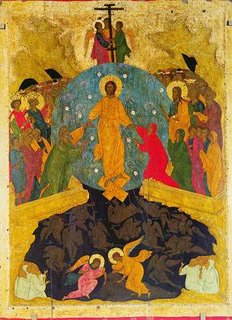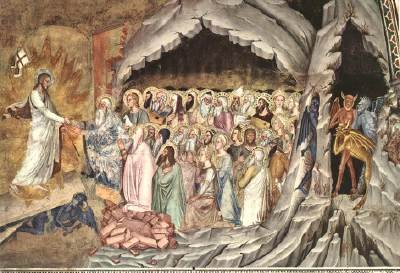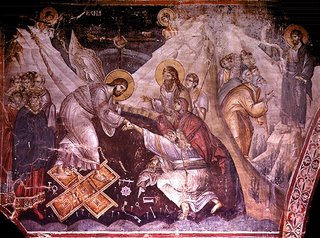Monday, April 23, 2007
Country Music and Why
Sunday, April 15, 2007
Love Triumphs: The Easter Octave and the Liturgy of the Redemption Fills the World
when all blood had abandoned the Heart and all spirit the soul:
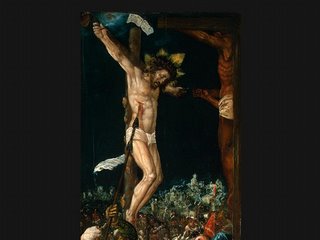 then it was only nothingness that bled, only the water of perfect exhaustion that still flowed when the lance bored in (visibly into the Heart of flesh, and invisibly into soul, spirit and God): in me God himself became exhausted. The Inexhaustible was exhausted. Life was lived out. Love was loved out.
then it was only nothingness that bled, only the water of perfect exhaustion that still flowed when the lance bored in (visibly into the Heart of flesh, and invisibly into soul, spirit and God): in me God himself became exhausted. The Inexhaustible was exhausted. Life was lived out. Love was loved out.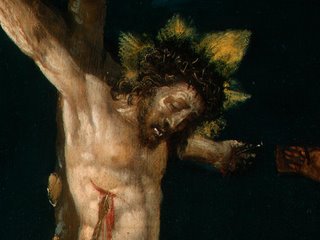
Life was lived out.
Love was loved out.
This was my victory. In the Cross was Easter.
 In death the grave of the world was burst open.
In death the grave of the world was burst open.
In the leap into the void was the ascension to heaven.
Now I fill the world, and at last every soul lives from my dying.
You do not bear the judgment, but the grace. … Your participation in the redemption (your status as co-redeemers, we might say) is but an analogy, an expression of my love. But it is real: I myself make it real and valid. I make up for your failure and bring it to plenitude. … Taste with me the futility of the redemption. It is from such stuff that the Father has always wrought his grace. There is a judgment; in the Father’s hand there is a balance. In the one scale there lies the heavy and oppressive futility of it all. In the other, a buoyant, mounting hope. And, as the first scale falls, the judgment is decided. Hope mounts up and my Kingdom triumphs; a soaring escape.
Let us look steadfastly to the blood of Christ, and see how precious that blood is to God, which, having been shed for our salvation, has set the grace of repentance before the whole world.
--Pope St Clement, First Epistle to the Corinthians
***Considering the event of today, you might want to watch/listen to/pray with "Divine Mercy and How This Effects Your Thinking," a program that features Fr. Benedict Groeschel and a dear friend, Br. Michael Gaitley, MIC.***
Saturday, April 14, 2007
The Resurrected Christ, the Wellspring, & the Liturgy
Christ is risen; he is truly risen! Now everything begins.

On this day of birth the river of life becomes LITURGY as it spreads out from the tomb and reaches us in the incorruptible body of Christ.
[T]he risen Christ [is] the inexhaustible wellspring of the liturgy. […] He is united to the Father and radiates the glory of God from his own body; being united to the wellspring he gives life (see Jn 5:20-21 and 26-27). The river of life can now flow forth from the throne of God and from the throne of the Lamb. The liturgy has been born; the Resurrection of Jesus is its first manifestation. The Resurrection of Jesus is not in the past, for if it were Jesus would not have conquered our death. […] [T]he death of Jesus was by its nature the death of death. But the event wherein death was put to death cannot belong to the past, for then death would not have been conquered. […] The hour on which the desire of Jesus was focused “has come, and we are in it” forever; the event that is the Cross and Resurrection does not pass away.
The Resurrection of Jesus is not in the past, for if it were Jesus would not have conquered our death. […] [T]he death of Jesus was by its nature the death of death. But the event wherein death was put to death cannot belong to the past, for then death would not have been conquered. […] The hour on which the desire of Jesus was focused “has come, and we are in it” forever; the event that is the Cross and Resurrection does not pass away.
More than that, it is the only true event in all of history. All other events are dead and will always be dead; this one alone remains.
The hour in which the Word with a loud cry handed over his Breath of love so that men might live is no longer in the past; it is, it abides, it lives on through history and sustains it.
This unprecedented power that the river of life exercises in the humanity of the risen Christ—that is the liturgy! In it all the promises of the Father find their fulfillment (Acts 13:32). Since that moment the communion of the Blessed Trinity has ceaselessly been spreading throughout our world and flooding our time with its fullness. Henceforth the economy of salvation takes the form of liturgy.
--Fr. Jean Corbon, OP, The Wellspring of Worship
Friday, April 13, 2007
He Makes All Things New Again
(Rev. 21.5)
Thursday, April 12, 2007
This Tree is my eternal salvation ...

 This Tree, vast as heaven itself, rises from earth to the skies, a plant immortal, set firm in the midst of heaven and earth, base of all that is, foundation of the universe, support of this world of men, binding-force of all creation, holding within itself all the- mysterious essence of man. Secured with the unseen clamps of the spirit, so that, adjusted to the Divine, it may never bend or warp, with foot resting firm on earth it towers to the topmost skies, and spans with its allembracing arms the boundless gulf of space between.
This Tree, vast as heaven itself, rises from earth to the skies, a plant immortal, set firm in the midst of heaven and earth, base of all that is, foundation of the universe, support of this world of men, binding-force of all creation, holding within itself all the- mysterious essence of man. Secured with the unseen clamps of the spirit, so that, adjusted to the Divine, it may never bend or warp, with foot resting firm on earth it towers to the topmost skies, and spans with its allembracing arms the boundless gulf of space between.He was All, and in all, filling it with himself; stripped naked for battle against the powers of the air. . .
With him two thieves were extended, bearing within themselves the marks of those two peoples, the marks of those two types of mind. . .
 When this cosmic combat came to an end ... the heavens shook; almost, the stars fell from the skies; the light of the sun was extinguished for a time; rocks were split asunder; the entire world was all but shattered ... But great Jesus breathed forth his divine Soul, saying: "Father, into Thy hand I commend my spirit." And lo, even while all things shuddered and heaved in earthquake, reeling for fear, his divine Soul ascended, giving life and strength to all; and again creation was still, as if this divine Crucifixion and Extension had everywhere unfolded and spread, penetrating all things, through all, and in all.
When this cosmic combat came to an end ... the heavens shook; almost, the stars fell from the skies; the light of the sun was extinguished for a time; rocks were split asunder; the entire world was all but shattered ... But great Jesus breathed forth his divine Soul, saying: "Father, into Thy hand I commend my spirit." And lo, even while all things shuddered and heaved in earthquake, reeling for fear, his divine Soul ascended, giving life and strength to all; and again creation was still, as if this divine Crucifixion and Extension had everywhere unfolded and spread, penetrating all things, through all, and in all.O Thou who art alone among the alone, and all in all! Let the heavens hold thy Godhead; and paradise, thy soul; and earth, thy blood. For the Indivisible has become divided, so that all might be saved, and the world below might not remain ignorant of the coming of God....

We beseech thee now, Lord God,
Christ, eternal King of souls:
stretch forth thy mighty hands over thy sacred Church,
and over a holy people for ever thine.
-Ancient Paschal Homily, 51
(aka Pseudo-Chrysostom, Sermon VI for Holy Week)
Wednesday, April 11, 2007
Feeling the Light of the Risen Son
I needed blood to tell me the truth,
the touch of blood. Even
my sight of the dark crust of it round the nailholes
didn't thrust its meaning all the way through to that manifold knot in me
that willed to possess all knowledge, refusing to loosen
unless that insistence won the battle I fought with life.
 But when my hand led by His hand's firm clasp
But when my hand led by His hand's firm claspentered the unhealed wound, my fingers encountering
rib-bone and pulsing heat, what I felt was not
scalding pain, shame for my obstinate need,
but light, light straming into me, over me, filling the room
as if I had lived till then in a cold cave, and now
coming forth for the first time, the knot that bound me unravelling,
I witnessed all things quicken to color, to form,
my question not answered but given its part
in a vast unfolding design lit by a risen sun.
--Denise Levertov, "St. Thomas Didymus"
Dominus Meus et Deus Meus : My Lord and My God

--St. Bonaventure, Mystical Vine
 Where did I triumph if not on the Cross? Are you as blind as the Jews and the pagans to think that Golgotha was my downfall and my failure? … Look: this is my secret, and there is no other in heaven or on earth: My Cross is salvation, my Death is victory, my Darkness is light. At that time, when I hung in torment and dread rushed into my soul because of the forsakenness, rejectedness, uselessness of my suffering, and all was gloomy, and only the seething rage of that mass of teeth hissed up mockingly at me, while heaven kept silence, shut tight as the mouth of a scoffer (but through the open gates of my hands and feet my blood bubbled out in spurts, and with each throb my Heart became more desolate, strength poured out from me in streams and there remained only faintness, death’s fatigue, infinite failure), and at last I neared that mysterious and final spot on the very edge of being, and then—the fall into the void, the capsizing into the bottomless abyss, the vertigo, the finale, the un-becoming: that colossal death which only I have died. Through my death this has been spared you, and no one will ever experience what it really means to die: This was my victory.
Where did I triumph if not on the Cross? Are you as blind as the Jews and the pagans to think that Golgotha was my downfall and my failure? … Look: this is my secret, and there is no other in heaven or on earth: My Cross is salvation, my Death is victory, my Darkness is light. At that time, when I hung in torment and dread rushed into my soul because of the forsakenness, rejectedness, uselessness of my suffering, and all was gloomy, and only the seething rage of that mass of teeth hissed up mockingly at me, while heaven kept silence, shut tight as the mouth of a scoffer (but through the open gates of my hands and feet my blood bubbled out in spurts, and with each throb my Heart became more desolate, strength poured out from me in streams and there remained only faintness, death’s fatigue, infinite failure), and at last I neared that mysterious and final spot on the very edge of being, and then—the fall into the void, the capsizing into the bottomless abyss, the vertigo, the finale, the un-becoming: that colossal death which only I have died. Through my death this has been spared you, and no one will ever experience what it really means to die: This was my victory.Haven’t I told you that if the grain of seed falls into the ground and dies it bears much fruit?
Of whom was I thinking when, as a freezing child, I lay in the crib, if not of you? Of what did I speak in the splendor of Tabor with Moses and Elias, if not of my suffering for you?
 For whom did I ask the Father for signs, if not for you? For whose sake did I stumble my way through fourteen endless stations, if not for yours? And my divinity and the embrace of my Father: for whom did I leave these if not for you? You want to follow me? You want to be called my disciples? Then let that mind be yours which animated me: being God in my very substance, I did not cling to my equality with God, but rather emptied and annulled myself. I took on the figure of a slave, becoming wholly like men and descending below myself in men’s everyday appearance, in bondage unto death, unto death on the Cross.
For whom did I ask the Father for signs, if not for you? For whose sake did I stumble my way through fourteen endless stations, if not for yours? And my divinity and the embrace of my Father: for whom did I leave these if not for you? You want to follow me? You want to be called my disciples? Then let that mind be yours which animated me: being God in my very substance, I did not cling to my equality with God, but rather emptied and annulled myself. I took on the figure of a slave, becoming wholly like men and descending below myself in men’s everyday appearance, in bondage unto death, unto death on the Cross.For to be God was not enough for me. … I wanted to prove my divinity to you in no way other than by letting go of it in order to become your slave.
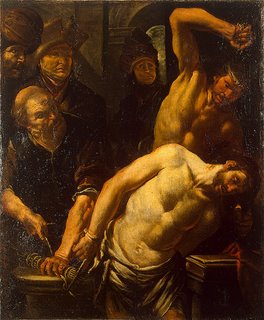 [T]he most divine thing about God (and to show this was my whole concern): God was free enough to give himself up. … This was his self-sufficiency: that he began to hunger and to thirst and that, in the person of his members, he suffered every sort of poverty and disgrace and imprisonment and nakedness and disease. This, my brothers, was his victory: that I was able to defeat even my divinity and that in the slave’s form I was able to manifest the Lord, and in sin’s likeness the essence of love. That, being outside of God, I knew how to be in God. That I became all in everything I was not.
[T]he most divine thing about God (and to show this was my whole concern): God was free enough to give himself up. … This was his self-sufficiency: that he began to hunger and to thirst and that, in the person of his members, he suffered every sort of poverty and disgrace and imprisonment and nakedness and disease. This, my brothers, was his victory: that I was able to defeat even my divinity and that in the slave’s form I was able to manifest the Lord, and in sin’s likeness the essence of love. That, being outside of God, I knew how to be in God. That I became all in everything I was not. Understand what it means to give oneself away. To strip oneself of one’s freedom out of freedom; and out of love, no longer to be free or to be lord over oneself; no longer to be able to determine where the journey will take you; to surrender oneself, to deliver oneself over to the series of consequences that carry us off in a direction we did not want—where to? You leap down from a high cliff. The leap is freely made, and yet, the moment you leap, gravity leaps upon you, and you tumble exactly like a dead stone to the very bottom of the gorge. This is how I decided to give myself. To give myself right out of my hand. To whom? It did not matter. To sin, to the world, to all of you, to the devil, to the Church, to the kingdom of Heaven, to the Father … I wanted to be the one given away par excellence. The corpse over which the vultures gather. The Consumed, the Eaten, the Drunk, the Spilled, the Poured Out. The Plaything. The Worn Out. The one squeezed to the very dregs. The one trod upon to infinity. The one run over. The one thinned to air. The one liquified into an ocean. The Dissolved. This was the plan; this was the will of the Father. By fulfilling it through obedience (the fulfillment itself was obedience), I have filled the world from heaven down to hell, and every knee must bend before me, and all tongues must confess me. Now I am all in all, and this is why the death which poured me out is my victory. My descent, my vertiginous collapse, my going under (under myself) into everything that was foreign and contrary to God—down into the underworld: this was the ascent of this world into me, into God. My victory.
Understand what it means to give oneself away. To strip oneself of one’s freedom out of freedom; and out of love, no longer to be free or to be lord over oneself; no longer to be able to determine where the journey will take you; to surrender oneself, to deliver oneself over to the series of consequences that carry us off in a direction we did not want—where to? You leap down from a high cliff. The leap is freely made, and yet, the moment you leap, gravity leaps upon you, and you tumble exactly like a dead stone to the very bottom of the gorge. This is how I decided to give myself. To give myself right out of my hand. To whom? It did not matter. To sin, to the world, to all of you, to the devil, to the Church, to the kingdom of Heaven, to the Father … I wanted to be the one given away par excellence. The corpse over which the vultures gather. The Consumed, the Eaten, the Drunk, the Spilled, the Poured Out. The Plaything. The Worn Out. The one squeezed to the very dregs. The one trod upon to infinity. The one run over. The one thinned to air. The one liquified into an ocean. The Dissolved. This was the plan; this was the will of the Father. By fulfilling it through obedience (the fulfillment itself was obedience), I have filled the world from heaven down to hell, and every knee must bend before me, and all tongues must confess me. Now I am all in all, and this is why the death which poured me out is my victory. My descent, my vertiginous collapse, my going under (under myself) into everything that was foreign and contrary to God—down into the underworld: this was the ascent of this world into me, into God. My victory. Thomas, you have plunged your finger into my open Heart.
 The wound of the body also reveals the spiritual wound. ...
The wound of the body also reveals the spiritual wound. ... Let us look through the visible wound to the invisible wound of love.
Tuesday, April 10, 2007
Event of Emmaus: Word and Sacrament
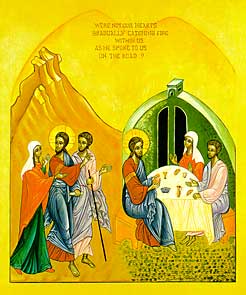 [H]ere too he [Christ] remains unrecognizable to the accustomed eye. … [H]e sets the hearts of the two wanderers aflame by his interpretation of the Scriptures and by breaking bread he opens their eyes. This is a reference to the two basic elements in early Christian worship, which consisted of the liturgy of the word (the reading and expounding of Scripture) and the eucharistic breaking of bread. In this way the evangelist makes it clear that the encounter with the risen Christ lies on a quite new plane; he tries to describe the indescribable in terms of the liturgical facts. He thereby provides both a theology of the resurrection and a theology of the liturgy: one encounters the risen Christ in the word and in the sacrament; divine service is the fashion in which he becomes touchable to us and recognizable as the living Christ. And conversely, the liturgy is based on the mystery of Easter; it is to be understood as the Lord’s approach to us. In it he becomes our travelling companion, sets our dull hearts aflame and opens our sealed eyes. He still walks with us, still finds us worried and downhearted, and still has the power to make us see.
[H]ere too he [Christ] remains unrecognizable to the accustomed eye. … [H]e sets the hearts of the two wanderers aflame by his interpretation of the Scriptures and by breaking bread he opens their eyes. This is a reference to the two basic elements in early Christian worship, which consisted of the liturgy of the word (the reading and expounding of Scripture) and the eucharistic breaking of bread. In this way the evangelist makes it clear that the encounter with the risen Christ lies on a quite new plane; he tries to describe the indescribable in terms of the liturgical facts. He thereby provides both a theology of the resurrection and a theology of the liturgy: one encounters the risen Christ in the word and in the sacrament; divine service is the fashion in which he becomes touchable to us and recognizable as the living Christ. And conversely, the liturgy is based on the mystery of Easter; it is to be understood as the Lord’s approach to us. In it he becomes our travelling companion, sets our dull hearts aflame and opens our sealed eyes. He still walks with us, still finds us worried and downhearted, and still has the power to make us see.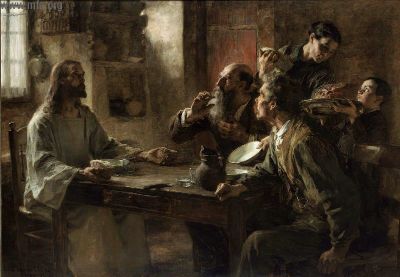 Experience of the risen Christ is something other than a meeting with a historical man, and it must certainly not be traced back to conversations at table and recollections which would have finally crystallized in the idea that he still lived and went about his business. Such an interpretation reduces what happened to the purely human level and robs it of its specific quality. The resurrection narratives are something other and more than disguised liturgical scenes; they make visible the founding event on which all Christian liturgy rests. They testify to an approach which did not rise from the hearts of the disciples but came to them from outside, convinced them against their doubts and made them certain that the Lord had truly risen. He who lay in the grave is no longer there; he—really he himself—lives. He who had been transposed into the other world of God showed himself powerful enough to make it palpably clear that he himself stood opposite them again, that in him the power of love had really proved itself stronger than the power of death.
Experience of the risen Christ is something other than a meeting with a historical man, and it must certainly not be traced back to conversations at table and recollections which would have finally crystallized in the idea that he still lived and went about his business. Such an interpretation reduces what happened to the purely human level and robs it of its specific quality. The resurrection narratives are something other and more than disguised liturgical scenes; they make visible the founding event on which all Christian liturgy rests. They testify to an approach which did not rise from the hearts of the disciples but came to them from outside, convinced them against their doubts and made them certain that the Lord had truly risen. He who lay in the grave is no longer there; he—really he himself—lives. He who had been transposed into the other world of God showed himself powerful enough to make it palpably clear that he himself stood opposite them again, that in him the power of love had really proved itself stronger than the power of death. The comfortable attempt to spare oneself the belief in the mystery of God’s mighty actions in this world and yet at the same time to have the satisfaction of remaining on the foundation of the biblical message leads nowhere; it measures up neither to the honesty of reason nor to the claims of faith. One cannot have both the Christian faith and “religion within the bounds of pure reason”; a choice is unavoidable. He who believes will see more and more clearly, it is true, how rational it is to have faith in the love that has conquered death.
The comfortable attempt to spare oneself the belief in the mystery of God’s mighty actions in this world and yet at the same time to have the satisfaction of remaining on the foundation of the biblical message leads nowhere; it measures up neither to the honesty of reason nor to the claims of faith. One cannot have both the Christian faith and “religion within the bounds of pure reason”; a choice is unavoidable. He who believes will see more and more clearly, it is true, how rational it is to have faith in the love that has conquered death. Monday, April 09, 2007
A Love Stronger Than Death: ALITHOS ANESTI!
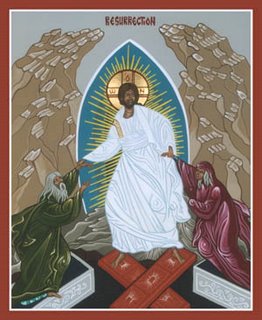 “Love is strong as death” (Song of Sol. 8.6). … [L]ove demands infinity, indestructibility; indeed it is, so to speak, a call for infinity. But it is also a fact that this cry of love’s cannot be satisfied, that it demands infinity but cannot grant it; that it claims eternity but in fact is included in the world of death, in its loneliness and its power of destruction. Only from this angle can one understand what “resurrection” means. It is the greater strength of love in face of death.
“Love is strong as death” (Song of Sol. 8.6). … [L]ove demands infinity, indestructibility; indeed it is, so to speak, a call for infinity. But it is also a fact that this cry of love’s cannot be satisfied, that it demands infinity but cannot grant it; that it claims eternity but in fact is included in the world of death, in its loneliness and its power of destruction. Only from this angle can one understand what “resurrection” means. It is the greater strength of love in face of death.For [man], since he has no continuance in himself, survival, from a purely human point of view, can only become possible through his continuing to exist in another.
[O]nly one could truly give lasting stability: he who is, who does not come into existence and pass away again but abides in the midst of transience: the God of the living, who does not hold just the shadow and echo of my being, whose ideas are not just copies of reality. … In him I can stand as more than a shadow; in him I am truly closer to myself than I should be if I just tried to stay by myself.
[O]nly where someone values love more highly than life, that is, only where someone is ready to put life second to love, for the sake of love, can love be stronger and more than death. … If the power of love for another were so strong anywhere that it could keep alive not just his memory, the shadow of his “I”, but that person himself, then a new stage in life would have been reached. … [This new realm] would signify the end of the sovereignty of bios, which is at the same time the sovereignty of death; it would open up the realm which the Greek Bible calls “zoe” that is, definitive life, which has left behind the rule of death. … It would no longer be evolution but decision and gift in one.
 [A]s man has no permanence in himself his survival could only brought about by his living on in another. … [O]nly the love which takes up the beloved in itself, into its own being, could make possible this existence in the other. … Jesus’ total love for men, which leads him to the cross, is perfected in total stepping-over to the Father and therein becomes stronger than death, because in this it is at the same time total “being held” by him.
[A]s man has no permanence in himself his survival could only brought about by his living on in another. … [O]nly the love which takes up the beloved in itself, into its own being, could make possible this existence in the other. … Jesus’ total love for men, which leads him to the cross, is perfected in total stepping-over to the Father and therein becomes stronger than death, because in this it is at the same time total “being held” by him.[I]mmortality always proceeds from love, never out of the autarchy of that which is sufficient to itself. … [T]his principle, properly understood, also applies even to God as he is seen by the Christian faith. … [W]hat is revolutionary about the Christian view of the world and of God … is that it learns to understand the “absolute” as absolute “relativity”, as relatio subsistens.
[L]ove found immortality, and immortality proceeds from love alone. … [H]e who has love for all has founded immortality for all. That is precisely the meaning of the biblical statement that his resurrection is our life. … [I]f he has risen, then we have too, for then love is stronger than death; if he has not risen, then we have not either, for then the situation is still that death has the last word, nothing else. … [E]ither love is stronger than death or it is not. … This also means, it is true, that our own love, left to itself, is not sufficient to overcome death; taken in itself it would have to remain an unanswered cry. It means that only his love, coinciding with God’s own power of life and love, can found our immortality.
It goes without saying that the life of him who has risen from the dead in not once again bios, the bio-logical form of our mortal life inside history; it is zoe, new, different, definitive life; life which has stepped beyond the mortal realm of bios and history, a realm which has here been surpassed by a greater power. … [T]his new life begot itself in history and had to do so, because after all it is there for history, and the Christian message is basically nothing else than the transmission of the testimony that love has here broken through death and thus transformed fundamentally the situation of all of us.
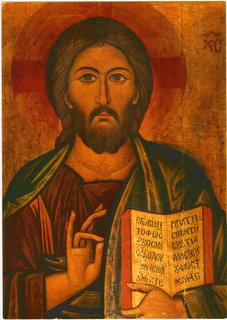 Top icon written by Joanna Ferencz.
Top icon written by Joanna Ferencz.
Sunday, April 08, 2007
Empty Tomb

When Mary Magdalen came to the tomb and did not find the Lord's body, she thought it had been taken away and so informed the disciples.

The Risen SON: Easter Sunday
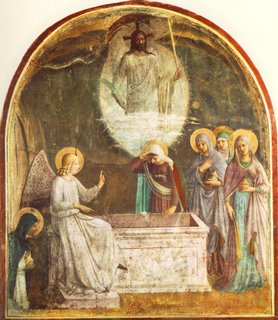
"I did not make you for the dungeon." In this Easter hour let us ask the Lord to visit the dungeons of this world; ... Let us ask him to enter into the spiritual prisons of this age, into the darkness of our lack of truth, revealing himself as the Victor who tears down the gates and says to us, "I, your God, have become your Son. Come out! I have not created you to be in prison for ever. I did not make you for the dungeon." In his play No Exit Jean Paul Sartre portrays man as a being who is hopelessly trapped. He sums up his gloomy picture of man in the words, "Hell is other people". This being so, hell is everywhere, and there is no exit, the doors are everywhere closed.
Christ, however, says to us, "I, your God, have become your Son. Come out!" Now the exact opposite is true: heaven is other people. Christ summons us to find heaven in him, to discover him in others and thus to be heaven to each other. He calls us to let heaven shine into this world, to build heaven here. Jesus stretches out his hand to us in his Easter message, in the mystery of the sacraments, so that Easter may be now, so that the light of heaven may shine forth in this world and the doors may be opened. Let us take his hand! Amen.
--Joseph Ratzinger (Pope BenedictXVI)
 Alithos Anesti!
Alithos Anesti!
CHRISTOS ANESTI! Christ Is Risen
 Only since Easter can we really utter the first article of faith; only on the basis of Easter is this profession rich and full of consolation: I believe in God, the Father Almighty. For it is only from the Lamb that we know that God is really Father, really Almighty.
Only since Easter can we really utter the first article of faith; only on the basis of Easter is this profession rich and full of consolation: I believe in God, the Father Almighty. For it is only from the Lamb that we know that God is really Father, really Almighty.The "Sun" Is Rising
 The light shines in the darkness, and the darkness has not overcome it. (Jn 1:5)
The light shines in the darkness, and the darkness has not overcome it. (Jn 1:5) Easter is concerned with something unimaginable. Initially the event of Easter comes to us solely through the word, not through the senses. So it is all the more important for us to be won over by the immensity of this word. Since, however, we can only think by employing sense images, the faith of the Church has always translated the Easter message into symbols which point to things that the word cannot express. The symbol of light ... plays a special part; the praise of the Paschal candle--a symbol of life in the midst of the darkened church--is actually a praise of him who proved victor over death. Thus the event of long ago is translated into our present time: where light conquers darkness, something of the Resurrection takes place.
Easter is concerned with something unimaginable. Initially the event of Easter comes to us solely through the word, not through the senses. So it is all the more important for us to be won over by the immensity of this word. Since, however, we can only think by employing sense images, the faith of the Church has always translated the Easter message into symbols which point to things that the word cannot express. The symbol of light ... plays a special part; the praise of the Paschal candle--a symbol of life in the midst of the darkened church--is actually a praise of him who proved victor over death. Thus the event of long ago is translated into our present time: where light conquers darkness, something of the Resurrection takes place.--Joseph Ratzinger (Pope BenedictXVI)
Saturday, April 07, 2007
Descent into Hell
He Descended into Hell
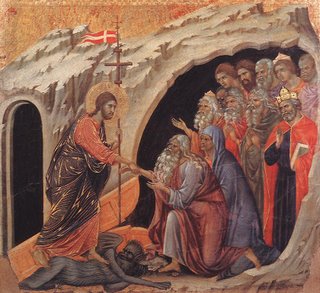 The icon ... represents as it were the mysterious inner dimension of the event of Easter which is indicated by a few words of Scripture and which we profess in the Creed when we say, "He descended into hell". In the perspective of the icon, this is an affirmation concerning Jesus' victory. The icon shows him having shattered the bolt of this world, having torn its gates from their hinges. It depicts him as the "stronger man" who has opened and penetrated the domain of the "strong man". It portrays him as the Victor, having burst through the supposedly impregnable fortress of death, such that death is now no longer a place of no return; its doors lie open. Christ, in the aura of his wounded love, stands in this doorway, addresses the still somnolent Adam and takes him by the hand to lead him forth. The liturgy of Holy Saturday circles around this event.
The icon ... represents as it were the mysterious inner dimension of the event of Easter which is indicated by a few words of Scripture and which we profess in the Creed when we say, "He descended into hell". In the perspective of the icon, this is an affirmation concerning Jesus' victory. The icon shows him having shattered the bolt of this world, having torn its gates from their hinges. It depicts him as the "stronger man" who has opened and penetrated the domain of the "strong man". It portrays him as the Victor, having burst through the supposedly impregnable fortress of death, such that death is now no longer a place of no return; its doors lie open. Christ, in the aura of his wounded love, stands in this doorway, addresses the still somnolent Adam and takes him by the hand to lead him forth. The liturgy of Holy Saturday circles around this event.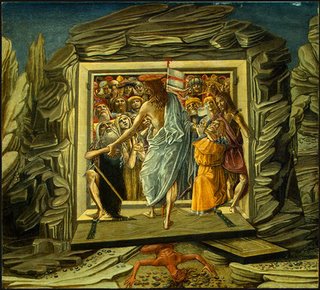
Friday, April 06, 2007
Entombment of Christ
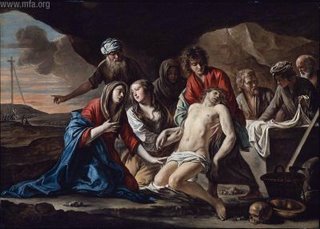 This is what is known as a first-class funeral.
This is what is known as a first-class funeral.The solicitous ones seem to be chiefly intellectuals.
With solemn gestures they flourish gravecloths,
making a liturgy,
absorbing themselves in its dignity.
Nothing indicates they expect a resurrection.
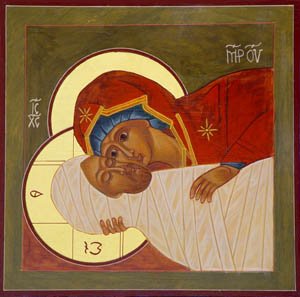
The corpse is swathed according to custom.
Only the face cannot be subdued.
All suffering stares from that head.
Impossible to wrap it in a great and festive forgetting.
So already his unquiet image haunts heads and hearts.
Already the spirit is freed.
Already the Easter question takes shape...
But silently.
For tomorrow is only Holy Saturday.
The day when God is dead,
and the Church holds her breath.
The strange day that separates life and death
in order to join them in a marriage beyond all human thought.
The day which leads through hell,
and, after all the paths of the world,
into a pathless existence.
--Hans Urs von Balthasar
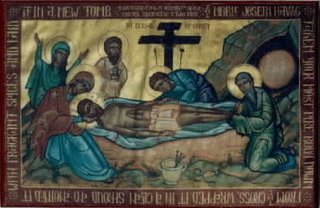
The Deposition of Christ
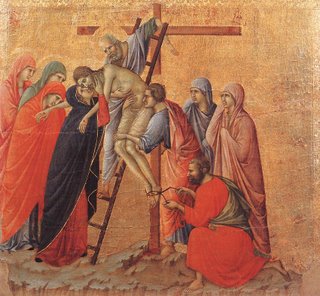 Jesus is taken down from the cross and his mother--accepting the pain that his Son bore for the sake of the world--is there to receive him in her bosom. Each of the seven swords which transfixed the heart of the mother was Mary's renewed assent to her Son's sufferings. It is beyond human comprehension that a person should say "yes" to everything, even to the most harrowing pain.
Jesus is taken down from the cross and his mother--accepting the pain that his Son bore for the sake of the world--is there to receive him in her bosom. Each of the seven swords which transfixed the heart of the mother was Mary's renewed assent to her Son's sufferings. It is beyond human comprehension that a person should say "yes" to everything, even to the most harrowing pain.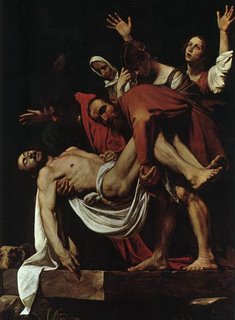
Christ on the Cross ... Some Thoughts
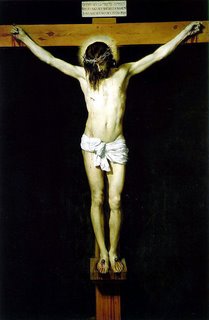
Stabat Mater: At the Cross
 Stabat mater dolorosa
Stabat mater dolorosaiuxta Crucem lacrimosa,
dum pendebat Filius.
At the Cross her station keeping,
stood the mournful Mother weeping,
close to Jesus to the last.
Cuius animam gementem,
contristatam et dolentem
pertransivit gladius.
Through her heart, His sorrow sharing,
all His bitter anguish bearing,
now at length the sword has passed.
O quam tristis et afflicta
fuit illa benedicta,
mater Unigeniti!
O how sad and sore distressed
was that Mother, highly blest,
of the sole-begotten One.
Quae maerebat et dolebat,
pia Mater, dum videbat
nati poenas inclyti.
Christ above in torment hangs,
she beneath beholds the pangs
of her dying glorious Son.
Quis est homo qui non fleret,
matrem Christi si videret
in tanto supplicio?
Is there one who would not weep,
whelmed in miseries so deep,
Christ's dear Mother to behold?
Quis non posset contristari
Christi Matrem contemplari
dolentem cum Filio?
Can the human heart refrain
from partaking in her pain,
in that Mother's pain untold?
 Pro peccatis suae gentis
Pro peccatis suae gentisvidit Iesum in tormentis,
et flagellis subditum.
Bruised, derided, cursed, defiled,
she beheld her tender Child
All with scourges rent:
Vidit suum dulcem Natum
moriendo desolatum,
dum emisit spiritum.
For the sins of His own nation,
saw Him hang in desolation,
Till His spirit forth He sent.
Eia, Mater, fons amoris
me sentire vim doloris
fac, ut tecum lugeam.
O thou Mother! fount of love!
Touch my spirit from above,
make my heart with thine accord:
Fac, ut ardeat cor meum
in amando Christum Deum
ut sibi complaceam.
Make me feel as thou hast felt;
make my soul to glow and melt
with the love of Christ my Lord.
Sancta Mater, istud agas,
crucifixi fige plagas
cordi meo valide.
Holy Mother! pierce me through,
in my heart each wound renew
of my Savior crucified:
Tui Nati vulnerati,
tam dignati pro me pati,
poenas mecum divide.
Let me share with thee His pain,
who for all my sins was slain,
who for me in torments died.
Fac me tecum pie flere,
crucifixo condolere,
donec ego vixero.
Let me mingle tears with thee,
mourning Him who mourned for me,
all the days that I may live:
Iuxta Crucem tecum stare,
et me tibi sociare
in planctu desidero.
By the Cross with thee to stay,
there with thee to weep and pray,
is all I ask of thee to give.
Virgo virginum praeclara,
mihi iam non sis amara,
fac me tecum plangere.
Virgin of all virgins blest!,
Listen to my fond request:
let me share thy grief divine;
Fac, ut portem Christi mortem,
passionis fac consortem,
et plagas recolere.
Let me, to my latest breath,
in my body bear the death
of that dying Son of thine.
Fac me plagis vulnerari,
fac me Cruce inebriari,
et cruore Filii.
Wounded with His every wound,
steep my soul till it hath swooned,
in His very Blood away;
Flammis ne urar succensus,
per te, Virgo, sim defensus
in die iudicii.
Be to me, O Virgin, nigh,
lest in flames I burn and die,
in His awful Judgment Day.
Christe, cum sit hinc exire,
da per Matrem me venire
ad palmam victoriae.
Christ, when Thou shalt call me hence,
by Thy Mother my defense,
by Thy Cross my victory;
Quando corpus morietur,
fac, ut animae donetur
paradisi gloria. Amen.
When my body dies,
let my soul be granted
the glory of Paradise. Amen.
"Woman, Behold, Your Son"
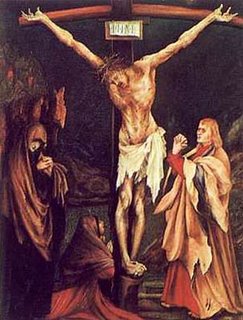 We must constantly return to this last gaze that Jesus fixes upon Mary, His Mother. The Infant Jesus' first gaze upon His Mother remains in silence. The Infant Jesus' first smile for His Mother existed, yet we know nothing about it. What the Gospel does give us is this last look which is doubtless accompanied by a smile, the smile of Christ Crucified, wherein Jesus conveys all His love, looking at Mary and saying to her: "Woman." Under the motion of the Holy Spirit, we must hold this name in great esteem. We must not become accustomed to it. Rather, we must see what is so astonishing in it. This final gaze of a beloved son upon his mother--especially when that Beloved Son is God!--consists in His calling her: "Woman."
We must constantly return to this last gaze that Jesus fixes upon Mary, His Mother. The Infant Jesus' first gaze upon His Mother remains in silence. The Infant Jesus' first smile for His Mother existed, yet we know nothing about it. What the Gospel does give us is this last look which is doubtless accompanied by a smile, the smile of Christ Crucified, wherein Jesus conveys all His love, looking at Mary and saying to her: "Woman." Under the motion of the Holy Spirit, we must hold this name in great esteem. We must not become accustomed to it. Rather, we must see what is so astonishing in it. This final gaze of a beloved son upon his mother--especially when that Beloved Son is God!--consists in His calling her: "Woman."Let us understand that Christ is not using this term in the sense that is generally used when refferring to "man" or "woman." It is much deeper. Is it true that Christ uses the conventional term. Perhaps this is precisely becaue Mary at the Cross is the Woman par excellence. She is the Woman as God has seen her in all her strength, the Woman par excellence. She is the New Woman, entirely relative to Jesus in His Mystery par excellence: the mystery of the Cross. She is the one who suffers with Jesus. She is the one who lives the same mystery that Jesus lives, who lives it with Him. She is so closely united with the Heart of Jesus that she endures everything He endures at the Cross, with and in Him. They are "one" as Jesus is "one" with the Father. We can say that Mary is "one" with Jesus at the Cross and that she brings to completion what is lacking in His Passion. [Cf. Col. 1:24] Of course, nothing is lacking as far as intensity of love is concerned; however, there is a lack as far as extension is concerned. And it is the proper role of woman to enable love to assume everything. This is perhaps the mystery of woman: to enable love to take hold of everything--that is, body and sensitivity, intelligence and will--and to render this love fruitful, to allow this love to become the source of another love, another life. Perhaps this is the ultimate secret.
Stealing Heaven: Christ and the Two Thieves
On the Cross: Dictations from a State of "Hell"
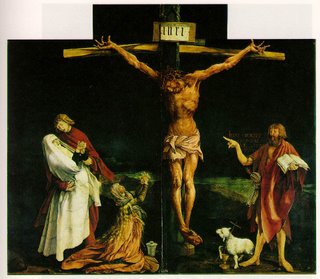
The wages of sin is death. The death on the Cross now represents this wage. Death is the reward and result of my sin. Every sin leads to death. But who will see the connection? Who has any idea how much of what is positive is destroyed in men through sin? ...
[Stretching out her arms] Now the crown of thorns is put in place; now the nails are hammered in, and with every blow sins are hammered into the soul and body of the Lord. The crown is formed from existing sins, those I intend to commit or those I am not finished with. The nails are formed of those of the past, the forgotten ones, those one no longer wishes to acknowledge or remember. [Sighing] Ah, and he made up for it all. For everything, everything. For everyone.
When the nails penetrate, they burst into the body of Christ all at once. Imagine that all the sins of my whole life, even those of mere thought, become present and penetrate into me through my hands and feet. They penetrate through an unimaginiable painful recognition. And the sins of the crown do no penetrate but make their mark. And the more painful it is and the more tired one is, so much the more still follows after. Don't you see it?
This monstrous shame. Now one has to receive for every sin the wage that is called death. Imagine someone who would want to make reparation in his living flesh for everything, for example, for every murder. Every murderous intention as well. He would become mincemeat. Even taking on just one small category of sin would already be totally unthinkable. But the Lord bears all sins and, so, all the kinds of death one could think of. And he bears it not as victim, as blows from without; he does not merely offer his body but hands over his whole being. He bears every sin from within as if he himself had committed it, with all its shame. A shame that now does not admit of repentance. Repentance and confession belong together in a unity that originates from the Cross, beyond the Cross. On the Cross, the Lord only reaches the insight into the heinousness of sin.
This Son who has handed over his divinity, his whole spirit to the Father, in order to be only man, is that man who lived without experiencing sin otherwise than in others. But because he now wants to be only the Son of Man, the exemplar of man, he has to experience every sin in the same way men would if ...
There is nothing ever so intimate that does not now undergo profanation. Every possible form of love is wounded in every possible way. And the Son has here to discover himself with his pure soul: in the midst of the most secret malice. As if someone finds himself doing what he had sworn to himself he would never do. The Son feels the same abhorrence for every sin, but he does not repel it as something foreign; he allows it to settle on himself. There is no way of deadening the impact. One sin more or less does not matter to a sinner; he would not mind taking on one for another person occasionally. His conscience is blunted. But the Lord feels every sin with his whole soul and body. In his death he dies all deaths. He leaves no sin behind as something finished with. Each one causes his death. The sin that is intended, the sin that is willed, the sin committed, everything always up to the limit where repentance begins, up to total abhorrence. And by going the way of terrible, perfect recognition (by means of his purity) he opens for us the way to repentance and confession. He himself is now unable to confess; he has no time left. Everything clashes so monstrously together that in grasping one thing, he always grasps everything else with it.
And all this in obedience! What can that mean: "Into your hands I commend my spirit"? ... There are still more parts that have to die ... I thirst. ... Adieu.



